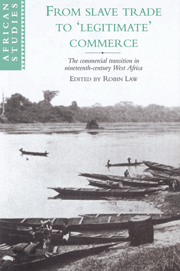 From Slave Trade to 'Legitimate' Commerce
From Slave Trade to 'Legitimate' Commerce Published online by Cambridge University Press: 21 September 2009
Although there has been much interest of late in the history of gender relations in Africa, relatively little has been done in studying these issues specifically in the pre-colonial period. In part, this may reflect a perception that there are insufficient detailed and reliable data to permit the reconstruction of the earlier history of gender relations in Africa; but one may also suspect the persisting influence of an assumption of effective social stasis in the pre-colonial period, implicit in the still common use of extrapolation from twentieth-century ethnography to provide an imputed cultural background for pre-colonial history. In fact, there is quite a bit of relevant evidence for the pre-colonial period, in contemporary European accounts of African societies. In particular, it seems possible to consider the implications for gender relations of the two great transformations in the character of West Africa's overseas commerce, the rise of the Atlantic slave trade in the seventeenth century and its replacement by ‘legitimate’ trade in the nineteenth. This essay considers the implications of the ending of the slave trade and the expansion of ‘legitimate’ trade (principally in palm oil and kernels) for gender relations in one specific region of West Africa, the neighbouring areas of Yorubaland and Dahomey (south-western Nigeria/southern Bénin). In intention it is exploratory and to some degree speculative rather than definitive or conclusive, raising questions rather than proposing clear answers to them.
The slave trade impacted on gender roles in two ways.
To save this book to your Kindle, first ensure no-reply@cambridge.org is added to your Approved Personal Document E-mail List under your Personal Document Settings on the Manage Your Content and Devices page of your Amazon account. Then enter the ‘name’ part of your Kindle email address below. Find out more about saving to your Kindle.
Note you can select to save to either the @free.kindle.com or @kindle.com variations. ‘@free.kindle.com’ emails are free but can only be saved to your device when it is connected to wi-fi. ‘@kindle.com’ emails can be delivered even when you are not connected to wi-fi, but note that service fees apply.
Find out more about the Kindle Personal Document Service.
To save content items to your account, please confirm that you agree to abide by our usage policies. If this is the first time you use this feature, you will be asked to authorise Cambridge Core to connect with your account. Find out more about saving content to Dropbox.
To save content items to your account, please confirm that you agree to abide by our usage policies. If this is the first time you use this feature, you will be asked to authorise Cambridge Core to connect with your account. Find out more about saving content to Google Drive.